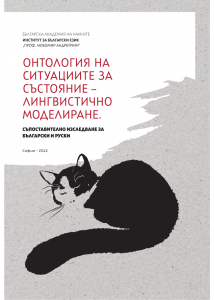Дативно-инфинитивные структуры и синтаксические идиомы в русском языке
Dative-infinitive structures and syntactic idioms in Russian
Author(s): Anton Zimmerling
Subject(s): Language studies, Language and Literature Studies, Applied Linguistics, Syntax, Lexis, Semantics, Cognitive linguistics, Descriptive linguistics, Eastern Slavic Languages, Phraseology
Published by: Институт за български език „Проф. Любомир Андрейчин“, Българска академия на науките
Keywords: dative-infinitive structures; syntactic idioms; neg-words; wh-words; infinitives; alethic modality; existential quantifications; biclausality; raising
Summary/Abstract: I discuss two sentence patterns expressing modal meanings in Modern Russian. Dative infinitive structures (DIS) have the taxonomic meaning of alethic (external) modality in sentences in the indicative mood. Root DIS clauses are productive, while embedded DIS clauses represent a relic type inherited from Old Russian: it only survives in sentences with identical clausal subjects. Syntactic idioms like негде спать, некого винить project an idiosyncratic finite sentence pattern with a negative existential head. The latter consists of a stressed negation не merged with an incorporated wh-word. Such elements, called neg-words, combine features of morphological units resembling dative predicatives with characteristics of reordered sentences derived by the raising of wh-words from embedded infinitival clauses to the matrix clause. Most sentences with predicative neg-words reconstruct affirmative counterparts, which are overtly bi-clausal. Russian sentences with predicative neg-words express the taxonomic meaning of existential quantification combined with the meaning of alethic impossibility. The modal subject does not impose restrictions on animacy in either sentence pattern. Both DIS sentences and syntactic idioms with neg-words are reordered bi-clausal structures, but the reordering vector is different: DIS sentences have a degraded upper clause, while the idioms with neg-words have a degraded embedded infinitival clause.
- Page Range: 281-300
- Page Count: 20
- Publication Year: 2022
- Language: Russian
- Content File-PDF

